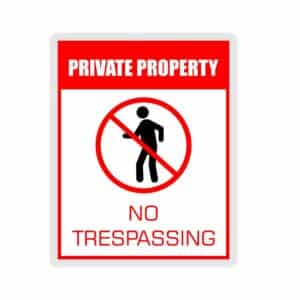Squatter’s Rights: Adverse Possession in California
A “squatter” is someone who takes up residence in a vacant property or land without legal permission.
In California, these individuals can potentially gain legal rights to vacant properties through a process known as adverse possession, collectively referred to as “squatter’s rights.”
This legal concept allows an illegal occupant to claim legal ownership of a property without purchasing it.
Learn more about the history of Squatters Law in California.
Difference Between Squatting and Trespassing

While squatting and trespassing involve illegally occupying vacant properties, they differ significantly in terms of intent and duration. Trespassers are typically short-term occupants, briefly invading a vacant space without considering it their primary residence. They have no intention of eventually claiming ownership.
In contrast, squatters move into vacant spaces with the intention of making them their permanent homes. They publicly occupy the property and remain there for the legally required period, usually several years. If not properly evicted during this uninterrupted period, squatters can file for adverse possession and gain full legal rights to the property.
California Civil Code Section-711(b)
Property owners in California should take note of Civil Code Section 711 (b). This important regulation requires property owners to serve written eviction notices to unauthorized occupants, either through personal delivery or certified mail with a return receipt. If these notices are ignored, and the squatters continue to occupy the property for 30 days or more, the property owner can initiate the eviction process.
Consequently, many property owners find it most efficient to seek a cash buyer who can facilitate a prompt and cost-effective eviction.
How Squatters Claim Adverse Possession in California
Adverse possession, including squatter’s rights, is protected throughout the United States, but the criteria vary by state. In California, squatters must meet six essential criteria to gain legal rights to vacant property:
- Hostile Possession: Squatters must occupy the property without the owner’s permission, intending to possess it as though they were the owner. Paying rent to the property owner negates hostile possession.
- Actual Possession: Squatters must actively live in the property, treating it as their own. They can prove actual possession through various means, including maintenance, utility payments, renovations, and adding protective enclosures.
- Continuous Possession: Squatters must remain in the property without interruption for an extended period, typically a minimum of five years in California.
- Exclusive Possession: Squatters must live alone, and multiple squatters cannot apply for adverse possession of the same property.
- Open & Notorious: Squatters must be conspicuous in their occupation, making the general public aware of their presence. This prevents claims of concealed occupation.
- Payment of Property Taxes: In California, squatters are required to pay all property taxes, fees, and maintenance bills for five consecutive years. They must provide certified proof of these payments through records from the local tax collector.
Unlike some states, California does not recognize adverse possession through “Color of Title.” Only squatters meeting these criteria can legally file for possession. By doing so, they can revitalize neglected properties, providing them with a new purpose.
How to Evict a Squatter in California
California prioritizes property owners’ rights and offers several options for evicting squatters. The most straightforward method is “cash-for-keys,” where property owners pay squatters to leave. While this may seem unfair, it’s often the quickest way to resolve the situation.

If this approach fails, property owners can offer to rent the property to the squatter or provide written permission for their presence. However, both options may complicate future eviction efforts. Ultimately, the most effective means of removing a squatter is through an eviction notice. If the squatter does not vacate the property after receiving the notice, property owners can file an “unlawful detainer” lawsuit to regain rightful possession.
Frequently Asked Questions
How long does it take to evict a squatter in California?
The timeline for evicting a squatter in California is subject to variations based on unique circumstances and legal procedures. In most cases, the entire process takes approximately 30 to 60 days to conclude. This encompasses delivering a formal notice, initiating an unlawful detainer lawsuit, securing a court judgment, and executing the eviction through collaboration with local law enforcement.
It’s essential to note that this timeframe can fluctuate when complications or delays arise at any phase of the process. Seeking guidance from a local attorney with expertise in eviction law is highly advisable to guarantee adherence to all required steps and timelines.
How long can you legally squat in California?
In California, the process of acquiring property through squatting is legally termed as “adverse possession.” To establish a legitimate claim and eventually gain ownership, squatters must fulfill certain criteria.

These include maintaining uninterrupted occupancy of the property for a minimum of five years, fulfilling property tax obligations, and having a valid claim of right to the property, which can be established through a written instrument or openly and conspicuously occupying the property.
It’s important to note that squatting is not a formally endorsed means of obtaining property, and squatters may encounter eviction or even criminal charges if the rightful property owner pursues legal action.
Can police remove squatters in California?
In California, the police possess the authority to evict squatters, but this action can only be initiated by the property owner following a specific legal procedure. To begin, the property owner must establish that the squatters are trespassing. This typically entails posting a “no trespassing” sign and issuing a written notice to the squatters, requesting them to vacate the premises.
If the squatters persist in staying, the property owner can initiate an unlawful detainer lawsuit, commonly referred to as an eviction lawsuit, to legally displace them. After securing a judgment and a writ of possession from the court, law enforcement can then step in to enforce the court’s directive and expel the squatters from the property.
Can you go to jail for squatting in California?
Yes, squatting in California can lead to jail time. Squatting is considered trespassing, categorized as a misdemeanor in the state. Individuals caught squatting could face fines and up to six months of imprisonment. In some cases, if it’s classified as burglary, the penalties may involve longer sentences. It’s crucial to understand the legal implications of squatting and seek legal housing solutions to avoid potential legal issues. Click here to learn more.




